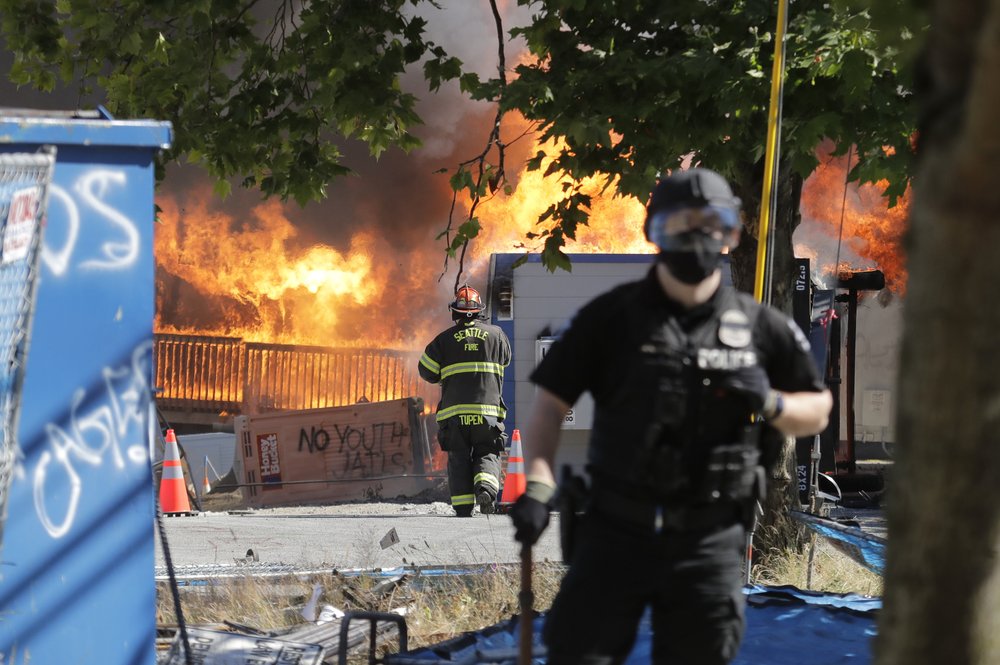Seattle police retreated to a precinct early Sunday, just hours after declaring a riot during large demonstrations in the city’s Capitol Hill neighbourhood near where weeks earlier people had set up an “occupied protest zone” that stretched for several blocks.

Some demonstrators lingered after officers filed into the department’s East Precinct around 1 a.m., but most cleared out a short time later, according to video posted online.
Authorities said rocks, bottles, fireworks and mortars were thrown at officers as they attempted to clear the area using flash bangs and pepper spray over the course of several hours stretching into Saturday night.
Seattle police Chief Carmen Best called for peace at a late-night news conference, and told reporters she hadn’t seen U.S. agents the Trump administration dispatched to the city at Saturday’s protest.
Via Twitter, police said they arrested at least 45 people for assaults on officers, obstruction and failure to disperse. Twenty-one officers were left with mostly minor injuries.
Earlier, protesters in Seattle broke through a fence where a youth detention facility was being built, with some people setting a fire and damaging a portable trailer, authorities said.
Thousands of protesters had initially gathered peacefully near downtown in a show of solidarity with fellow demonstrators in Portland, Oregon, where tensions with federal law enforcement have boiled over during protests stemming from the killing of George Floyd in Minneapolis.

Get daily National news
Initially there was no sign of law enforcement near the Seattle march. Later, Seattle Police said via Twitter that about a dozen people breached the construction site for the King County youth detention facility. Also, police said protesters broke out windows at a King County court facility.

Earlier this week King County Executive Dow Constantine, in response to long-standing demands by community activists, said he would work to eliminate youth detention centres in the county by 2025.
After the fire at the construction site authorities said they had ordered people to leave a different area, in a section of Capitol Hill, near downtown, where the East Precinct is. At least one person broke through a fence line at the precinct, authorities said, and moments later a device explosive that left an 8-inch (20-centimetre) hole in the side of the precinct.
Earlier this month police cleared the “Capitol Hill Occupied Protest” zone after two fatal shootings. A group had occupied several blocks around a park for about two weeks following standoffs and clashes that were part of the nationwide unrest over the killing of George Floyd in Minneapolis.
Prior to Saturday’s protests, Best had announced officers would be armed with pepper spray and other weapons, promising officers would not use tear gas and urging demonstrators to remain peaceful.
“In the spirit of offering trust and full transparency, I want to advise you that SPD officers will be carrying pepper spray and blast balls today, as would be typical for events that carry potential to include violence,” Best said.
At an emergency hearing on Friday night, U.S. District Judge James Robart granted a request from the federal government to block Seattle’s new law prohibiting police from using pepper spray, blast balls and similar weapons.
The temporary restraining order halts the law that the Seattle City Council passed unanimously last month after confrontations that have largely been peaceful but were occasionally marked by violence, looting and highway shutdowns. The law intended to de-escalate tensions between police and demonstrators was set to take effect on Sunday.
But the U.S. Department of Justice, citing Seattle’s longstanding police consent decree, successfully argued that banning the use of crowd control weapons could actually lead to more police use of force, leaving them only with more deadly weapons.







Comments
Want to discuss? Please read our Commenting Policy first.